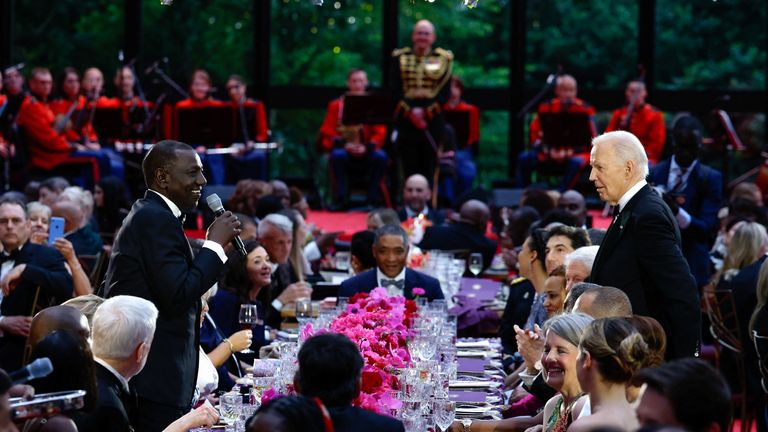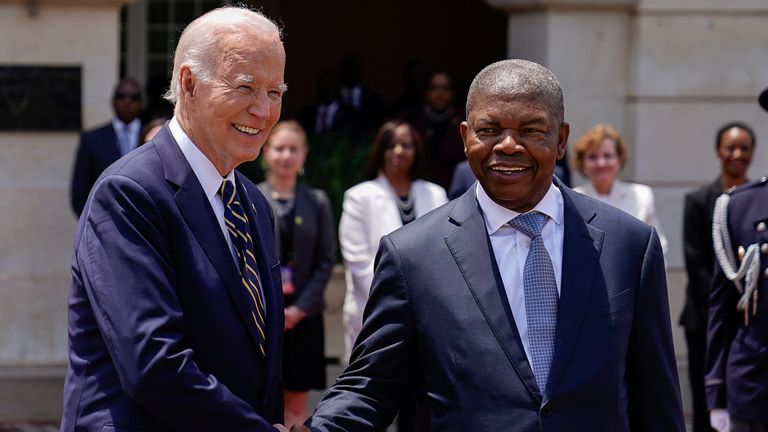Joe Biden’s Long-Awaited Visit to Africa in the Final Weeks of His Presidency Highlights U.S. Disconnect from the Continent | World News
Joe Biden is currently visiting Angola, an event that the US State Department has deemed “historic”.
This marks the first occasion a sitting US president has set foot in sub-Saharan Africa in nearly a decade.
However, instead of enhancing his legacy in Africa, this trip underscores the reality that the US is not only diminishing its influence in the region but is also significantly out of touch.
Upon Mr Biden‘s arrival in Angola‘s capital, Luanda, reports emerged of deadly missile strikes targeting displaced individuals in the famine-stricken Zamzam camp in North Darfur, Sudan.
The attacks are attributed to a paramilitary faction that emerged from the janjaweed militias infamous for their brutality in Darfur during the early 2000s.
The Rapid Support Forces, engaged in a vicious battle with Sudan’s military over territory, have been accused of war crimes and crimes against humanity nationwide.
When he was a senator, Joe Biden labeled immediate action in Darfur as “a moral obligation.”
As president, however, he designated the United Arab Emirates—the primary alleged supporters of the Rapid Support Forces—as a “major defense partner”.
Read more
Joe Biden pardons his son
What is the US presidential pardon?
His representatives have not managed to bring Sudan’s conflicting factions to the negotiation table and have failed to neutralize a crucial US ally amid the escalating world’s largest humanitarian crisis.
In May, Mr Biden welcomed Kenyan President William Ruto to the White House, marking the first visit from an African leader since 2008.
While Mr Ruto and Mr Biden exchanged pleasantries and celebrated 60 years of US-Kenya relations, the people of Kenya were rising up against rampant governmental corruption.
Just weeks later, as Kenyan police arrived in Haiti to lead a US-funded peacekeeping mission, they were also firing upon peaceful protesters in Nairobi.
In Angola, similar tragedies unfolded as anti-government demonstrators were shot and killed in the capital in the weeks leading up to Mr Biden’s visit.
Competition with China and Russia for Africa’s loyalty
Instead of rectifying previous errors and misguided military interventions, this trip to Angola appears to be an endeavor to outmaneuver China and Russia for Africa’s economic allegiance.
Prior to the visit, a senior official from the State Department outlined the intent of the trip as providing an alternative to counterbalance Chinese investments.
As of now, Angola’s primary trading partners are China and India, with China having surpassed the US as Africa’s key trading partner since 2013.
The US has also seen a decline in military influence in Africa, having lost a significant drone base in Agadez, Niger, following the withdrawal of US troops from both Niger and neighboring Chad.
American experts on global security have observed the disintegration of US foreign policy, which has become one significant failure under Mr Biden.
“This marks the first visit of a sitting US president to Sub-Saharan Africa since 2015, and it occurs amidst a backdrop where pardons have taken precedence over his policies,” states Ian Ralby, a maritime security expert and CEO of IR Consilium.
“It reflects America’s inability to recognize that the future of global demographics—and consequently economics—lies in Africa.”
“If the US were genuinely competing, visits to Africa would be commonplace rather than exceptional.”
This trip, long-awaited and postponed until the final weeks of his presidency, has unfolded amid news of him pardoning his son, resulting in the Biden administration’s efforts in Africa concluding with a thud rather than a flourish.






